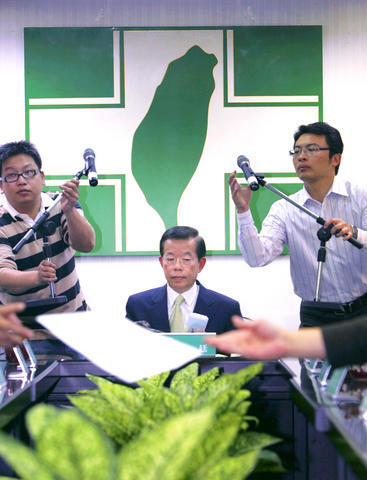Democratic Progressive Party (DPP) presidential candidate Frank Hsieh (謝長廷) resigned as party chairman yesterday, pending the approval of the party's Central Executive Committee, which is to call a meeting today to discuss the matter.
Another meeting will also be called to examine the party's recent election defeats. Recommendations will be presented to a provisional National Congress, the date of which will be decided by the Central Executive Committee today.
Also on the National Congress' agenda is amending the party charter and election rules for party officials.

PHOTO: WALLY SANTANA, AP
DPP Secretary-General Lee Ying-yuan (李應元) told reporters after yesterday's Central Standing Committee meeting that committee members resolved to ask Hsieh to assist the party with its soul-searching and reform program until a new party leader is elected on May 25.
Lee refused to describe the resolution as an attempt to ask Hsieh to stay, saying Hsieh had made it clear that he would not stand in the party chairman election or any race for public office.
Lee said he did not know whether Hsieh would accept the committee's request, but one thing was clear: Hsieh would not accept the offer "if its sole purpose was to get him to stay."
The committee's request came in response to a petition initiated by DPP Legislator Chai Trong-rong (
Hsieh's resignation came on the heels of the DPP's defeat in Saturday's election. It is customary in the DPP for the party chairman to bear responsibility for an election loss by resigning.
Hsieh succeeded President Chen Shui-bian (陳水扁) as party chairman following the DPP's losses in the legislative elections in January.
Saying the party must fully examine its three recent election losses, Hsieh yesterday proposed during the Central Standing Committee meeting that first, the party must assess its position and realize that it is about to become an opposition that "has nothing at all."
"The people do not have the obligation to support the DPP," he said. "If we do not implement a thorough reform, it is possible that we will dissolve in the near future."
Secondly, Hsieh said that the party must solicit more young members and let them participate in the party's reform program and decision-making process.
Thirdly, Hsieh proposed holding a temporary National Congress meeting to let party representatives voice their opinions and discuss the party's future and its course. The party should amend its charter and election rules so younger members can elect the next leader in May, he said.
Finally, Hsieh urged the party to serve as a check on the power of the ruling party, but they should help the Chinese Nationalist Party (KMT) implement good policies, he said.
He also called on president-elect Ma Ying-jeou (
Meanwhile, Hsieh and Presidential Office Secretary-General Yeh Chu-lan (
Hsieh said he did not meet former DPP chairman Shih Ming-teh (
Shih claimed that Hsieh's campaign agreed to force Chen to step down in an attempt to salvage the DPP's election.

‘DENIAL DEFENSE’: The US would increase its military presence with uncrewed ships, and submarines, while boosting defense in the Indo-Pacific, a Pete Hegseth memo said The US is reorienting its military strategy to focus primarily on deterring a potential Chinese invasion of Taiwan, a memo signed by US Secretary of Defense Pete Hegseth showed. The memo also called on Taiwan to increase its defense spending. The document, known as the “Interim National Defense Strategic Guidance,” was distributed this month and detailed the national defense plans of US President Donald Trump’s administration, an article in the Washington Post said on Saturday. It outlines how the US can prepare for a potential war with China and defend itself from threats in the “near abroad,” including Greenland and the Panama

A wild live dugong was found in Taiwan for the first time in 88 years, after it was accidentally caught by a fisher’s net on Tuesday in Yilan County’s Fenniaolin (粉鳥林). This is the first sighting of the species in Taiwan since 1937, having already been considered “extinct” in the country and considered as “vulnerable” by the International Union for Conservation of Nature. A fisher surnamed Chen (陳) went to Fenniaolin to collect the fish in his netting, but instead caught a 3m long, 500kg dugong. The fisher released the animal back into the wild, not realizing it was an endangered species at

The Chinese Nationalist Party (KMT) is maintaining close ties with Beijing, the Democratic Progressive Party (DPP) said yesterday, hours after a new round of Chinese military drills in the Taiwan Strait began. Political parties in a democracy have a responsibility to be loyal to the nation and defend its sovereignty, DPP spokesman Justin Wu (吳崢) told a news conference in Taipei. His comments came hours after Beijing announced via Chinese state media that the Chinese People’s Liberation Army’s Eastern Theater Command was holding large-scale drills simulating a multi-pronged attack on Taiwan. Contrary to the KMT’s claims that it is staunchly anti-communist, KMT Deputy

The High Prosecutors’ Office yesterday withdrew an appeal against the acquittal of a former bank manager 22 years after his death, marking Taiwan’s first instance of prosecutors rendering posthumous justice to a wrongfully convicted defendant. Chu Ching-en (諸慶恩) — formerly a manager at the Taipei branch of BNP Paribas — was in 1999 accused by Weng Mao-chung (翁茂鍾), then-president of Chia Her Industrial Co, of forging a request for a fixed deposit of US$10 million by I-Hwa Industrial Co, a subsidiary of Chia Her, which was used as collateral. Chu was ruled not guilty in the first trial, but was found guilty